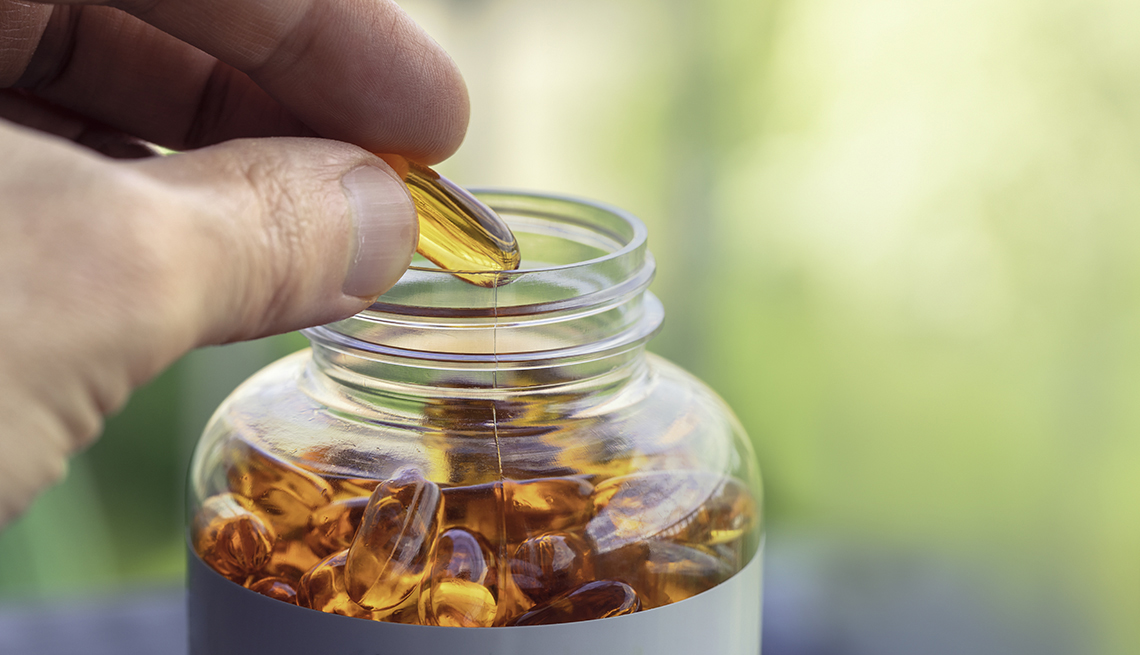
- Select a language for the TTS:
- UK English Female
- UK English Male
- US English Female
- US English Male
- Australian Female
- Australian Male
- Language selected: (auto detect) - EN
Play all audios:
FOR EXPERT TIPS TO HELP FEEL YOUR BEST, GET AARP’S MONTHLY _HEALTH_ NEWSLETTER. FOR EVERYONE ELSE, JUST EAT FISH Medical breakthroughs aside, doctors agree: If you're healthy and at low
risk for heart disease, the best way to get any omega-3s — or any nutrient — is from the food you eat. Some studies show that consuming fish twice a week cuts your risk of heart disease or
having a stroke. However, notes Erin Michos, M.D., associate director of preventive cardiology at John Hopkins School of Medicine, epidemiology is tricky. “Fish consumption has been shown
with a lower association of cardiovascular risk, but it's hard to tell if it's the fish itself or the result of other healthy behaviors,” says Michos. “There are studies that show
that adherence to a Mediterranean diet, which is often rich in fish, is associated with lower cardiovascular risk. But people who follow the diet may have other healthy habits. They may
exercise more, schedule more prevention screenings and take good care of themselves in general, as opposed to people who eat McDonald's every day." Another possible reason for the
encouraging results: Time spent in front of a plate of salmon — or another fatty fish brimming with omega-3s — is time not spent stopping at the local fast food drive-thru for a burger and
fries. As Matt Budoff, a cardiologist affiliated with UCLA Medical Center, puts it: “Fish is a smart replacement for bad things.” The American Heart Association recommends two servings of
fish a week (3.5 ounces per cooked serving), preferably the fatty kind that's rich in omega-3s. Good sources — besides salmon — include mackerel, herring, lake trout, sardines and
albacore tuna. Vegetarians, people with allergies or those who dislike seafood can shop for plant-based sources of omega-3 fatty acid, including vegetables (Brussels sprouts and spinach),
walnuts, flaxseed and pumpkin seeds. A caveat: Plant foods typically contain only one of the three main omega-3 fatty acids: alpha-linolenic acid (ALA), which the body turns into EPA and
DHA. “The problem, though, is that only a small percentage of it is converted into EPA and DHA,” says Donald Hensrud, M.D., medical director of the Mayo Clinic Healthy Living Program and
author of _The Mayo Clinic Diet_, so the amount of omega-3 fatty oil that people can get from those foods is pretty low. (Though, as Hensrud points out, “If someone is following a good
vegetarian or vegan diet, they're probably at a lower risk for heart disease anyway.") If you still are not ready to stop taking your fish oil supplements, know that any omega-3s
are best absorbed with food that contains some (healthy) fat and that you should stick to fairly low doses. (Harvard Medical School draws the line at 1,000 milligrams a day). Also talk to
your physician about potential interactions it might have with medications you take. “Fish oil has a blood thinning effect,” says Tod Cooperman, M.D., president and founder of
ConsumerLab.com. “If you're on a blood thinner, or you're going to be having surgery, talk to your doctor before taking supplements.” You should also make sure that any you already
take, or shop for in the future, come with a seal of approval from places like U.S. Pharmacopeia, ConsumerLab.com or NSF International. These three independent organizations test popular
supplements to see that they are properly manufactured, contain the ingredients (and doses) listed on the label, and don't contain harmful contaminants. That's important since
over-the-counter dietary supplements, unlike prescription medications, aren't closely regulated by the U.S. Food and Drug Administration to ensure that manufacturing has met high
standards for quality, safety and effectiveness — so you can't always be sure of what you're swallowing, or that the doses claimed of things like fatty acids are accurate.










